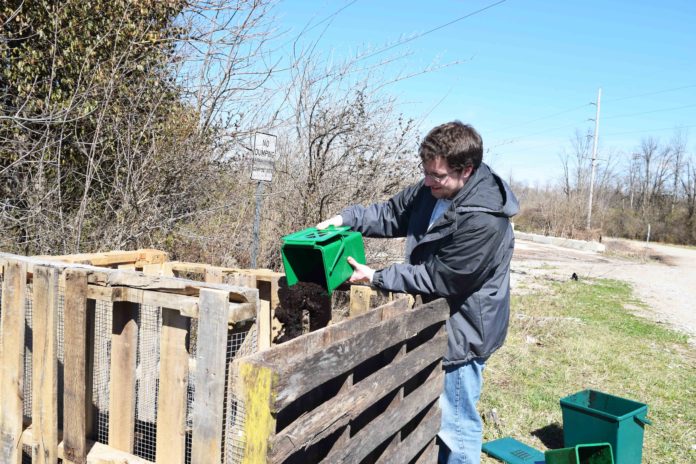
Instead of throwing away the 35 pounds of used coffee grounds from Cafe Allegro, Cafe Roy, and Hoover Dining Hall, Campus Farm is now using them for compost.
The project was initiated by the Zero Waste group from the Sustainability Leadership Program (SLP) as one of their required semester projects. “With the new farm being out by the indoor track, we wanted to start getting some sort of fertilizer going and coffee grounds were a great way to go,” Thomas Grier, junior and Zero Waste’s leader, said.
Composted soil has more nutrients than the soil in the ground, Malorie Imhoff, Sustainability Coordinator and Campus Farm Manager, said. “What is great about coffee grounds is that they also have phosphorus and potassium, which are really great for the plant’s health,” Imhoff said.
Apart from helping the plants, composted soil accomplishes the Zero Waste group’s main goal, which is to reduce the amount of materials going to landfills. “This [coffee grounds] is something that is normally just tossed out or thrown down the drain,” Grier said, “and this is something we can use that will benefit any type of garden or farm no matter how big or small scale it is.”
Grier said it was hard to get the project moving at first, but the actual process of getting the coffee grounds has not been difficult. “Working out the kinks to get it started was tedious, but after we got it going then it wasn’t hard at all,” Grier said.
Campus cafes and Hoover Dining Hall have each been given a bin with a charcoal filter to prevent bad odors, and instead of throwing the coffee grounds away, they put them in those bins. During the week, members of Zero Waste and a member of Campus Farm collect the coffee grounds by placing them in the bins attached to bikes purchased for this project.
After students pick up the coffee grounds, they take them to the new campus farm site by the Indoor Tennis and Track Center, where there is a composting bin. Throughout the week students add dead leaves to the coffee grounds and turn them once a month.
To make composted soil there needs to be 60 percent of brown waste, 25 percent of green waste, and 15 percent soil and water. The coffee grounds serve as the green waste, which provides the Nitrogen to the soil, but they are still working on getting the amount of brown waste they need.
“Our ratio for carbon [brown waste] isn’t correct right now, with the amount of coffee grind were getting we need to put way more leaves than we have,” Rafael Robert, junior and Campus Farm leader, said.
Brown waste consists of dry leaves, cardboard, twigs, etc., but they need more brown waste for the large amount of coffee grounds they are collecting. With just the three locations, they have collected about 875 pounds of coffee grounds in five weeks. “I think it [getting brown waste] will be easier once we have more leaves in the Fall,” Robert said.
Robert said they hope to have the compost ready by the fall, so that Campus Farm will begin to prepare the soil and the compost in order to then put the compost in the soil.
This project has helped Campus Farm get one step closer in achieving their goal of becoming certified organic. It takes several years to get the organic certification, but using composted soil means their fruits are organic and free of chemicals. “Instead of using chemicals to put nutrients in our soil, we’re using natural things like the coffee grinds and the leaves,” Robert said.
Having fruits that are free of chemicals would benefit DePauw University’s students because the fruits from the Campus Farm go to Bon Appetit's establishments on campus. “It’s a great cyclical thing, so they give is the coffee grounds and then we use it to make strong plants and then we give those fruits that the plant produce back to Bon Appetit,” Imhoff said.
Grier and Imhoff hope to expand the places they collect compost material from. Now that the convenience store is open they will start getting coffee grounds from there as well, and they might also start collecting the fruit scraps from the Blend.
“We want to make sure there are a lot of opportunities out there for students to learn,” Imhoff said, “but also for us to make an impact in our local environment and hopefully tackle some global issues here on a local scale.”
